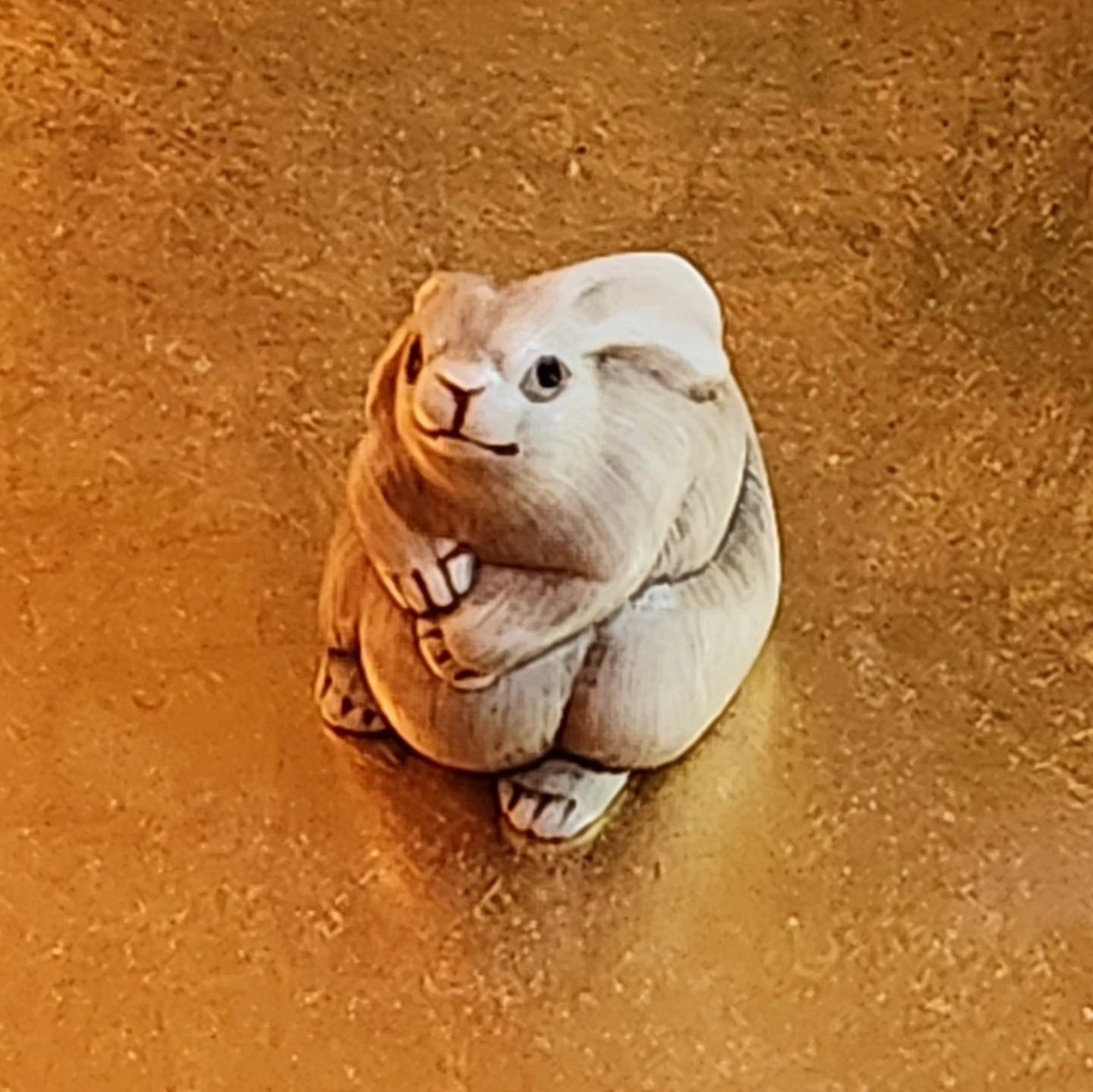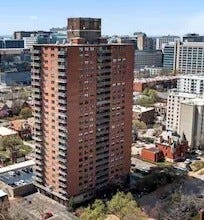An Old Man and His Memories - I Wasn't Always Old, You Know.
Looking Back At a Long Queer Life
(Note: This is another of the parts of my novella An Old Man and His Memories that has arrived late. Those of you who followed that novella and its companions, Song of the Amorous Frogs and Left Bank On the Bayou, as they appeared in parts over the last two years, will already know Narrator, Clem and Our Cellist. If you didn’t, then this may not make much sense. But it will take its proper place in the larger work soon - and that larger work may actually be finished - soon!)
The April sun poured through the windows as I looked around the room at the objects that had furnished our lives together, and now furnished my memories.
There was the Japanese netsuke, in the shape of a perhaps pregnant rabbit, that Our Cellist and I had bought as a present for Clem on a significant birthday, ending in a zero. Not that all birthdays aren't significant, and precious, the more so as the number mounts up.
The little ivory creature looked up at me with the sad eyes that had captured all our hearts the instant we'd seen them in the shop at the St. Louis Art Museum. Those sad eyes the greatest treasure I'd discovered in any museum in any city in a lifetime - and ours to be taken home for a few dollars, and treasured for that part of a lifetime that remained. We three had treasured them together, and now I still treasured them, alone.
There was our cello, standing in the corner where Our Cellist always put it. And had put it once again the last time he brought it home from the last rehearsal that would not lead to a next concert, for him.
I looked around the room for my contributions, and there were some, but the one I now hoped to find, the one I hadn’t thought of in years, I didn’t see, and I didn’t remember where I might have put it. A box, decoupaged with cancelled postage stamps, by a dear friend (now long departed herself), into which I’d put all the most treasured letters from my past, love letters some of them, or brilliant (scandalous!) literary tours de force of gay sensibility from another age – put in the box for safe keeping until they might become treasures again in the old-age days of memory. Those days had now arrived, and I would have liked to fill my afternoon with reading the letters again – a perilous undertaking, perhaps, on a day when sentiment already threatened to swamp reason, as it did so often now.
When the perils of passion have long ago evanesced with time, looking back at such letters can be bittersweet and exquisite, even with (perhaps especially with) tears. It had been years since I’d looked in the box. Years since I’d seen it even, but I knew it must be somewhere. Hidden away for safe-keeping, or to keep the contents from the eyes of even my two great loves – even though some of the tucked away treasures had come from them.
Some, but not all. Others had contributed too, letters only for me to see. Mementos of a life that had been mine alone, a life that it seemed important I guard, even from those dearly loved. Not from duplicity or shame, but as proof that “I” had been before “we” had become almost all – and reassurance that “I” could be again now that “we” had gone.
But I couldn’t remember where I’d put it, and such lapses frightened me now. If memory goes, what’s left? A concern only for the old, of course, since the young have such few memories to forget, and the hubris to think they never could. Or is it the hubris of the old to think we know how the world must be for them too? If I left off thinking about it, maybe it would come to me, sometime, where I’d put the box.
I walked over to the window and looked out toward the Executive House Apartments across the street, a “modern” behemoth that had been built in the 1960s, much to our consternation, since it obstructed our view of the vast stretch of city going out to the south as far as one could see. All of us in the Hawthorne had complained mightily at the time, of course, but such complaints, from those of us who were only citizens of modest influence (and little wealth), made no difference when directed at real estate developments of Executive House scale. I’d learned that lesson in development-mad Houston, and found no need to revise that view after my move north, even though St. Louis was not quite so deeply planted in the pockets of her developers.
But after all, Executive House was not such an eyesore, once old eyes had time to grow accustomed to it. Certainly uglier buildings had been built. We even came to enjoy that, from our 17th story windows, we could glimpse the pool on the west side, and the tiny specks of Speedoed young men sunning themselves around it on fine sunny days such as today. From such a height, we could dream all of them into tan, muscled Adonises.
I could see six such Adonises today, one in his tiny red Speedo displaying all he had to offer, to all who might care to see. And it only April. By summer, there would be dozens, hardly any of them there to swim. Swimming might have its place, but not at that pool on a sunny spring or summer day. On such days, that was a site for finding love, or satisfying lust at least; or, for some of us, watching and remembering other days and other places, when those finding (or looking, at least) had been us. Temps perdu.
Watching them now in their spring preening, I almost opened the window to call down to them, “I wasn’t always old, you know.”
But I didn’t. Such a pointless gesture.
The too-secret location of the box of treasures did not come back to me, even with my clever ploy of diversion. Such is so often the way with our clever tricks, especially those we try playing on ourselves. Regardless of what the psychiatrists would have us believe, we really know the tricks we’re playing, and so how could they possibly succeed?
Like the trick I tried out when I told myself I could continue on alone without tearful thoughts of those gone, the life lost, if only I mustered sterner stuff from deep inside. I doubted there was any of that sterner stuff to muster, however deep I looked. I would go on – no doubt of that – until I didn’t, but not without the tears – from time to time.
Today, I’d collected my shirts from Sam Wah; I’d gone to Habs House; I’d written the checks: the routines that were themselves clever ploys to convince me that my life still had a plot. There are many fundamentals in life that we do not appreciate until they’re gone. Routine is one of them. How often I’d bristled, after a while of our ménage, that we’d each come to have our parts in the life we shared, and each expected all of us to keep playing them. How often I’d wished for some disruption to shake us up, and shake us into lives, if not more “thrilling,” then at least less routine.
And then the disruption came, as it does to every life eventually, and what I’d have given then (would give now) for the return of the routine.
Something else to yell out the open window. For whoever might be there to hear.
Rather than words comes the thought of high windows: The sun-comprehending glass, And beyond it, the deep blue air, that shows Nothing, and is nowhere, and is endless. From “High Windows,” by Philip Larkin







